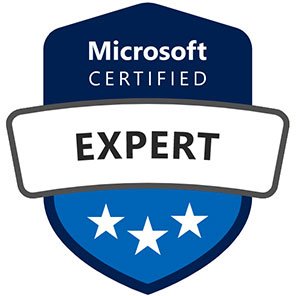Course Length: 4-Days
Course Overview
This course provides the knowledge and skills to design and implement DevOps processes and practices. Students will learn how to plan for DevOps, use source control, scale Git for an enterprise, consolidate artifacts, design a dependency management strategy, manage secrets, implement continuous integration, implement a container build strategy, design a release strategy, set up a release management workflow, implement a deployment pattern, and optimize feedback mechanisms
Audience Profile
Students in this course are interested in implementing DevOps processes or in passing the Microsoft Azure DevOps Solutions certification exam.
Prerequisites
- Students should have fundamental knowledge about Azure, version control, Agile software development, and core software development principles. It would be helpful to have experience in an organization that delivers software.
- It is recommended that you have experience working in an IDE, as well as some knowledge of the Azure portal. However, students who may not have a technical background in these technologies, but who are curious about DevOps practices as a culture shift, should be able to follow the procedural and expository explanations of continuous integration regardless
MS AZ 900 Microsoft Azure Fundamentals
Course Outline
Get started on a DevOps Transformation Journey
- Introduction to DevOps
- Choose the Right Project
- Describe Team Structures
- Choose the DevOps Tools
- Plan Agile with GitHub Projects and Azure Boards
- Introduction to Source Control
- Describe types of Source Control Systems
- Work with Azure Repos and GitHub
Development for Enterprise DevOps
- Structure your Get Repo
- Manage Git Branches and Workflows
- Collaborate with Pull Request in Azure Repos
- Explore Git Hooks
- Plan Foster Inner Source
- Manage Git Repositories
- Identify Technical Dept
Implement CI with Azure Pipelines and GitHub Actions
- Explore Azure Pipelines
- Manage Azure Pipeline Agents and Pools
- Describe Pipelines Agents and Pools
- Describe Pipelines and Concurrency
- Explore Continuous Integration
- Implement a Pipeline Strategy
- Integrate with Azure Pipelines
- Introduction to GitHub Actions
- Learn Continuous Integration with GitHub Actions
- Design a Container Build Strategy
Design and Implement a Release Strategy
- Introduction to Continuous Delivery
- Create a Release Pipeline
- Explore Release Recommendations
- Provision and Test Environments
- Manage and Modularize Tasks and Templates
- Automate Inspection of Health
Implement a Secure Continuous Development Using Azure Pipelines
- Introduction to Deployment Patters
- Implement Blue-Green Deployment and Feature Toggles
- Implement Canary Releases and Dark Launching
- Implement A-B Testing and Progressive Exposure Deployment
- Integrate with Identity Management Systems
- Management Application Configuration Data
Manage Infrastructure as Code Using Azure and DSC
- Explore Infrastructure as Code and Configuration Management
- Create Azure Resources using Azure Resource Manager Templates
- Create Azure Resources by using Azure CLI
- Explore Azure Automation with DevOps
- Implement Desired State Configuration (DSC)
- Implement Bicep
Implement Security and Validate Code Bases for Compliance
- Introduction to Secure DevOps
- Implement Open-Source Software
- Software Composition Analysis
- Static Analyzers
- OWASP and Dynamic Analyzers
- Security Monitoring and Governance
Design and Implement a Dependency Management Strategy
- Explore Package Dependencies
- Understand Package Management
- Migrate Consolidate and Secure Artifacts
- Implement a Versioning Strategy
- Introduction to GitHub Packages
Implement Continuous Feedback
- Implement Tools to Track Usage and Flow
- Develop Monitor and Status Dashboards
- Share Knowledge within Teams
- Design Processes to Automate Application Analytics
- Manage Alerts, Blameless Retrospectives and Just Culture
You May Also Be Interested In:
Certification

Microsoft Certified: DevOps Engineer Expert
Exam AZ-400: Designing and Implementing Microsoft DevOps Solutions
To become a Microsoft Certified: DevOps Engineer Expert, you must earn at least one of the following:
Microsoft Certified: Azure Administrator Associate
Microsoft Certified Azure Developer Associate certification.
